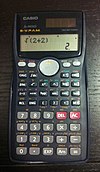Casio FX-603P
 An FX-603P in working condition | |
| Type | Programmable scientific |
|---|---|
| Manufacturer | Casio |
| Introduced | 1990 |
| Calculator | |
| Entry mode | Infix |
| Precision | 12 digits mantissa, ±99 exponent |
| Display type | LCD Dot-matrix |
| Display size | 2×16 Character |
| Programming | |
| Programming language(s) | Keystroke (fully merged, Turing complete) |
| Memory register | 110 |
| Program steps | 6,144 |
| Interfaces | |
| Ports | one vendor specific |
| Connects to | Compact Cassette via:
Line Printer via one of: PC via one of: |
| Other | |
| Power supply | 2×"CR-2032" Lithium + 1×"CR-2032" Lithium |
| Weight | 141g, 5 oz |
| Dimensions | 15.24x7,6x1.2 cm, 6"×3"×½" |
The FX-603P was a programmable calculator, manufactured by Casio from 1990. It was the successor model to the Casio FX-602P. Since it was only released in a limited number of countries in small quantities, it is now an excessively rare item which commands high prices when sold.
Display
[edit]The FX-603P featured a two line dot matrix display with 16 characters each as main display. An additional 4 digits 7-segment display used to display the program step when entering or debugging programs and 20 status indicators.
Programming
[edit]The programming model employed was key stroke programming by which each key pressed was recorded and later played back. On record multiple key presses were merged into a single programming step. There were only a very few operations which needed two bytes.[1]
The FX-603P could store 6,144 steps. Data could be stored in 110 memory register. The FX-603P series supported 20 labels for programs and subroutines called P0 .. P19 - twice the amount of the predecessor models. Each program or subroutine could have up to 10 local labels called LBL0 .. LBL9 for jumps and branches.
The FX-603P supported indirect addressing both for memory access and jumps and therefore programming model could be considered Turing complete.
The FX-603P was backward-compatible with the FX-602P could load FX-602P programs from Compact Cassette.
Programming example
[edit]Here is a sample program that computes the factorial of an integer number from 2 to 69. For 5!, you'll type 5 P0 and get the result, 120. With the additional alpha output the program is 14 byte long.
| Key-code | Comment |
|---|---|
| MODE2 | Change to mode 2 to enable editing of program areas P0 to P19 |
| P0 | From the program list, press P0 button to start editing the program area P0 |
| ALPHAn!=ALPHA | output "n!=" in first row of display. Result will be shown in 2nd line |
| HLT | waits for user input, user types in number and presses EXE button to continue program |
| Min00 | stores the value typed in by the user in register M00 |
| 1 | put 1 in current immediate register so there is a value to multiple with |
| LBL0 | label for the loop |
| * | multiply |
| MR00 | by n |
| DSZ GOTO0 | decrements M00 and back to LBL0 until M00=0 |
| = | end of loop, the machine has calculated |
Interface
[edit] | |
| Connects to | Compact Cassette via one of:
Line Printer via: Personal computer via: |
|---|---|
| Manufacturer | Casio |
| Type | Multi Interface |
The FX-603P used the same FA-6 interface as used by the Casio FX-840P, Casio FX-841P, Casio FX-850P, Casio FX-860P, Casio FX-860Pvc, Casio FX-870P, Casio FX-880P, Casio FX-890P, Casio VX-1, Casio VX-2, Casio VX-3, Casio VX-4, Casio Z-1 and Casio Z-1GR programmable calculator and pocket computers. This interface features a Kansas City standard Compact Cassette interface, a Centronics printer port and a RS-232 interface.[2]
References
[edit]External links
[edit]- FX-603P topic on casio.ledudu.com site with many images and manual download.
- FX-603P home page with in-depth information.
- Casio FX-603P on Caz Pocket Computers Collection
- FX-603P on RS-Key maintained by Viktor Toth.


